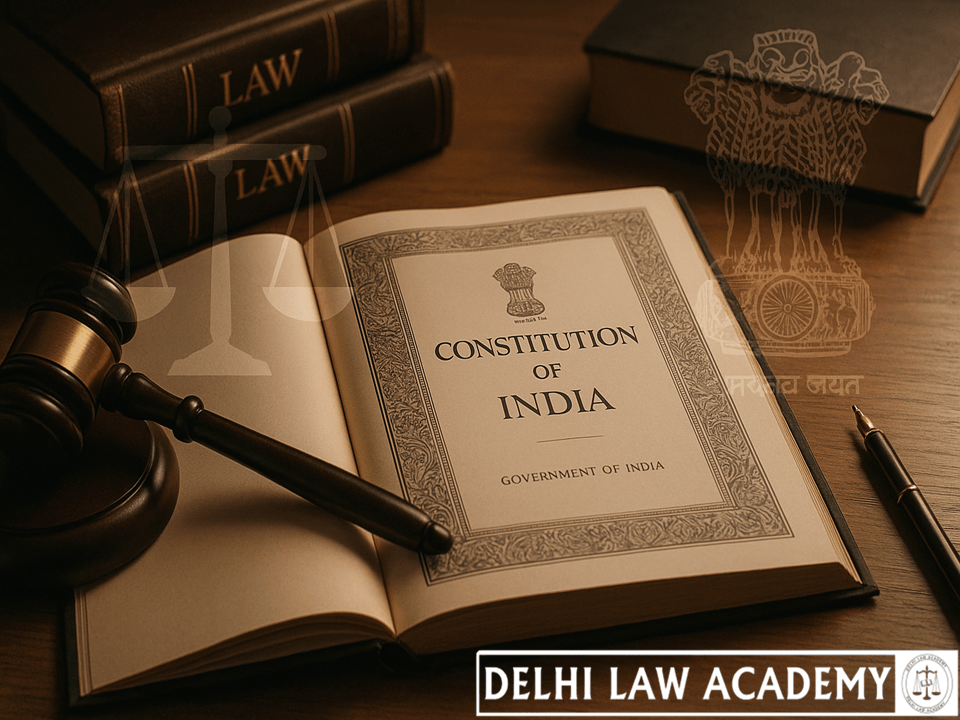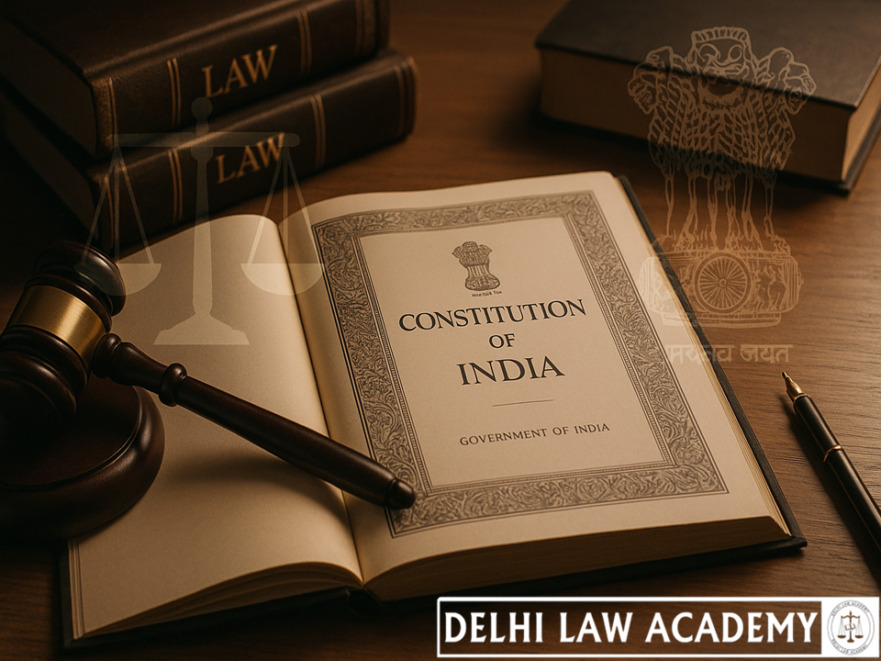
Delhi Law Academy Jaipur presents below for aspirants of RJS, DJS, PCS (J) and other Judicial Services throughout India a simplified Note on the Constitutional provisions relating to constitution and functioning of the State Judiciary.
📘 Constitutional Provisions
📍 Article 214 — High Court for States
- There shall be a High Court for each State
📍 Article 215 — Court of Record
- Every High Court shall be a court of record
- It shall have power to punish for contempt of itself
Note
- A court of record is a court whose acts and proceedings are enrolled for perpetual memory and testimony
- These rolls are of such high and super-eminent authority that their truth is not to be called in question
📍 Article 216 — Constitution of High Courts
- Number of judges in a High Court is to be decided by President from time to time
📍 Article 217 — Appointment of Judges
Original provision:
- Judges of High Court are to be appointed by President after consultation with Chief Justice of India, Governor of State, Chief Justice of High Court
Appointment after the 99th Amendment:
- Judges of High Court are to be appointed by President on recommendation of the National Judicial Appointments Commission
Current Legal Status
- On 16.10.2015 the 99th Amendment Act and the NJAC Act have been struck down by the Supreme Court being unconstitutional, violating basic structure
Conditions of Office
- Judges of High Court to hold office till 62 years
- Resignation to be addressed to President
- Removal by President in the same manner as that of a judge of Supreme Court
Qualifications :
- Citizen of India
- Held judicial office in India for 10 years, or been an advocate of High Court for 10 years
- Question on age is decided by President after consultation with CJI
📍 Article 218 — Removal Proceedings
- Removal of a High Court judge as per clauses (4) and (5) of Article 124
📍 Article 219 — Oath of Office
- A High Court judge has to make oath before Governor of the State
📍 Article 220 — Restriction on practice
- Ex-permanent judge of a High Court not to plead or act in any court or before any authority except Supreme Court and other High Courts
📍 Article 221 — Salaries of judges
- Salaries, allowances and privileges are to be determined by Parliament by law
📍 Article 222 — Transfer of judges
Original provision:
- Transfer by President after consultation with CJI
After 99th Amendment:
- Transfer by President on recommendation of NJAC
Current Legal Status
- 99th Amendment struck down on 16.10.2015
📍 Article 223 — Acting Chief Justice
- Duties performed by a judge appointed by President
📍 Article 224 — Additional judges
- President may appoint additional judges for max 2 years due to workload or arrears
📍 Article 226 — Power to issue writs
- HC can issue writs for enforcement of fundamental rights and for any other purpose
- Writs may be issued where cause of action arises
📍 Article 227 — Superintendence over courts
- HC has superintendence over courts/tribunals except Armed Forces tribunals
📍 Article 228 — Transfer of cases
- HC may withdraw cases involving constitutional questions
📍 Article 229 — Officers and servants
- Appointed by Chief Justice
- Expenses charged upon Consolidated Fund of State
📍 Article 230 — Jurisdiction over UTs
- High Court jurisdiction may be extended to UT by Parliament
📍 Article 231 — Common High Court
- Common HC for 2 or more states may be established
📍 Article 233 — District Judge
- Appointed by Governor in consultation with High Court
- Advocate of 7 years or more may be appointed
📍 Article 234 — Other judges
- Appointments by Governor after consultation with PSC & High Court
📍 Article 235 — Control over courts
- HC controls district and subordinate courts including postings/promotions
📍 Article 236 — Interpretation
- Judicial service = district judges + lower civil judges
📘 Stay Ahead with Delhi Law Academy!
Get access to free monthly current affairs, read our insightful blogs,
and explore free study resources prepared by experts at DLA Jaipur. 🚀
High Courts being courts of record can also punish for contempt of themselves.
This principle helps maintain judicial integrity and preserve official judicial records.
Transfers of judges between High Courts also require consultation with the CJI.
The NJAC amendment was struck down in 2015, restoring the collegium system.
They may resign by writing to the President, and removal follows the same impeachment-like procedure as Supreme Court judges under Article 124(4)–(5).
not only for Fundamental Rights but also “for any other purpose.”
High Courts can issue writs even when the person or authority is outside the territorial jurisdiction if the cause of action arises within the State.
They can issue directions, frame rules, and ensure proper functioning — except over courts related to Armed Forces.
A person not already in judicial service can be appointed if:
• They have been an advocate for at least 7 years, and
• They are recommended by the High Court.
Articles 233–235 collectively regulate their appointment and service conditions.
Contact us
📍 Delhi Law Academy – Jaipur Branch
6C, Tower 2, Coaching Hub, Pratap Nagar, Jaipur – 302033
📞 Phone:
+91 9911916552
+91 8447285606
✉️ Email:
contactus@delhilawacademy.com

